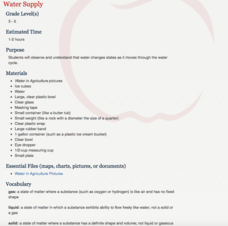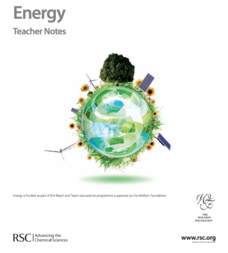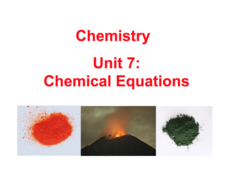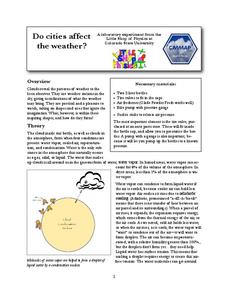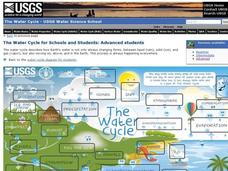Science Friday
Sublime Sublimation
Dry ice isn't dehydrated water, and young scientists learn why in this fascinating presentation. After watching a video, they complete three different activities using dry ice. Upon completion, they discuss the scientific principle.
National Institute of Food and Agriculture
Water Supply
Participate in three activities that look at the earth's limited water supply and the changes water goes through as it enters each phase of the water cycle. The resource is complete with three activities that demonstrate the changing...
Curated OER
Antonyms 4
Practice antonyms with your young readers! Ten questions provide one word, as well as five words underneath it. Learners choose the word from the list whose meaning is the most unlike the top word's meaning. You could use this resource...
Curated OER
Chapter 12 Review, Section 1: Solutions
Here is a different approach to solutions: a worksheet that has chemistry learners use words to describe them! This is an outstanding exercise that will stretch learners to show what they know. They answer questions comparing solutions,...
Curated OER
Chalk Chromatography
Your chemistry class is sure to love this experiment on column chromatography, as demonstrated with chalk sticks and felt tip markers. Pupils use sidewalk chalk (another inexpensive form of chalk stick) to demonstrate adsorption and the...
Curated OER
Physical Changes and States of Matter - Two
Here's a wonderful lesson on how substances change states. Groups of learners are given trays with a chocolate bar, a piece of paper, an ice cube, and a balloon. During the activity, the groups closely observe the changes that each...
Royal Society of Chemistry
Energy—Gifted and Talented Chemistry
What has more energy than a room full of pupils after a fire drill? This lesson plan! Explore the changes in energy during different chemical reactions, discover why some reactions feel cold and others feel hot, and tackle the concept of...
Science Geek
Kinetic Molecular Theory
The fourth presentation in a series of five begins with information about the nature of gases and what to expect from them. Then it discusses kinetic molecular theory, diffusion, and Graham's Law, and concludes with the purification of...
Curated OER
Unit 3 Bonding
An organized table charting the different types of chemical bonds arrays this resource. The octet rule, ionization energy, and the naming of compounds are also reviewed. Young chemists answer review questions in multiple choice fashion....
Normal Community High School
Chemical Equations
Viewers learn how to identify the substances in a chemical reaction, how to balance it, and the different types of chemical reactions by watching a presentation that also includes a review of monomers and polymers. The presentation ends...
Cornell University
Atomic Bonding
Explore the connection of surface area to bonding within atoms. Learners complete lab investigations to model changing surface area with different sizes and concentrations of atoms. A flour fireball demonstration follows the labs to...
Curated OER
What is Water?
Students examine water's properties. They participate in hands-on activities to show the properties of water.
Colorado State University
Do Cities Affect the Weather? (Making a Cloud in a Bottle)
The dynamics of a city can have a drastic effect on the weather. A hands-on lesson asks learners to build a model to illustrate how city pollution provides a nucleus for condensation. The greater the pollution, the greater chance for...
Curated OER
Chapter 2 and 3 Practice Worksheet - Formulas and Compounds
In this formulas and equations activity, chemistry apprentices write the chemical formulas given the names. They calculate percent composition, balance equations, and calculate the mass of a substance present in a fertilizer. This is a...
Curated OER
Water Cycle Reading and Writing
After listening to a story about the water cycle, learners create their own versions of this tale. This is a great way to have your class review the concepts of evaporation, condensation, precipitation, and runoff.
Curated OER
Water Cycle Reading and Writing
Here is a great way to get pupils to express a scientific concept in a fun way. After hearing the story of Walter the Water drop and learning facts about the water cycle, the class will write a creative expository piece describing what...
Curated OER
Everything is Made of Something
Young scientists can use this worksheet to learn about natural resources, as well as what we use them for. A word search prompts pupils to find sixteen words about natural resources.
Curated OER
Our Earth
In this Earth's environment worksheet, students complete a crossword puzzle given 35 clues about a variety of topics related to our Earth. Topics include ecosystems, precipitation, biomes, energy transfer, soil, weathering and rocks.
Curated OER
I Just Drank George Washington's Water!
Guide your learners through the water cycle with this lesson plan. Over the course of the lesson plan, they read two Magic School Bus books, discuss the water cycle, come up with water facts, complete a diagram of the water cycle,...
Science Geek
Intermolecular Forces of Attraction
Chemists love London (dispersion forces)! Presentation begins with an explanation of intermolecular forces including hydrogen bonding, dipole-dipole attraction, and London dispersion forces. It also covers polarity and the relative...
US Environmental Protection Agency
Thirstin's Wacky Water Adventure
Make a splash with young scientists as you teach them all about water using this activity packet. Thirstin, a cartoon glass of water, walks children through the water treatment process, teaches them about different sources of water, and...
Jefferson Lab
The Periodic Table of Elements
A study of the periodic table of elements doesn't have to be elementary! Deepen understanding of the building blocks of chemistry with an interactive periodic table. At first sight, the table looks like a standard reference page, but a...
US Geological Survey
The Water Cycle for Schools: Advanced Ages
Explore the water cycle in an interactive diagram of the process. The diagram shows how water is a moving system and constantly changing forms. The resourc includes vocabulary words that pupils click on in order to discover more about...
Curated OER
Daily Survival Requirements of Water
Students will use inquiry science to complete an investigation. They create hypotheses predicting the changes water undergoes in becoming ice and determine how much ice needs to be melted to create one 8 oz. glass of water.
Other popular searches
- Solids Liquids and Gases
- Solids Liquids Gases
- Solids, Liquids, Gases
- Solids, Liquids and Gases
- Pictures Solids Liquids Gas
- Solids, Liquids, and Gases
- Solids Liquids Gases Quiz
- Solids Liquids Gasses
- Matter Solids Liquids Gases
- Science Solids Liquids Gases
- Solids Liquids and Gasses
- Colloids Solids Liquids Gas



